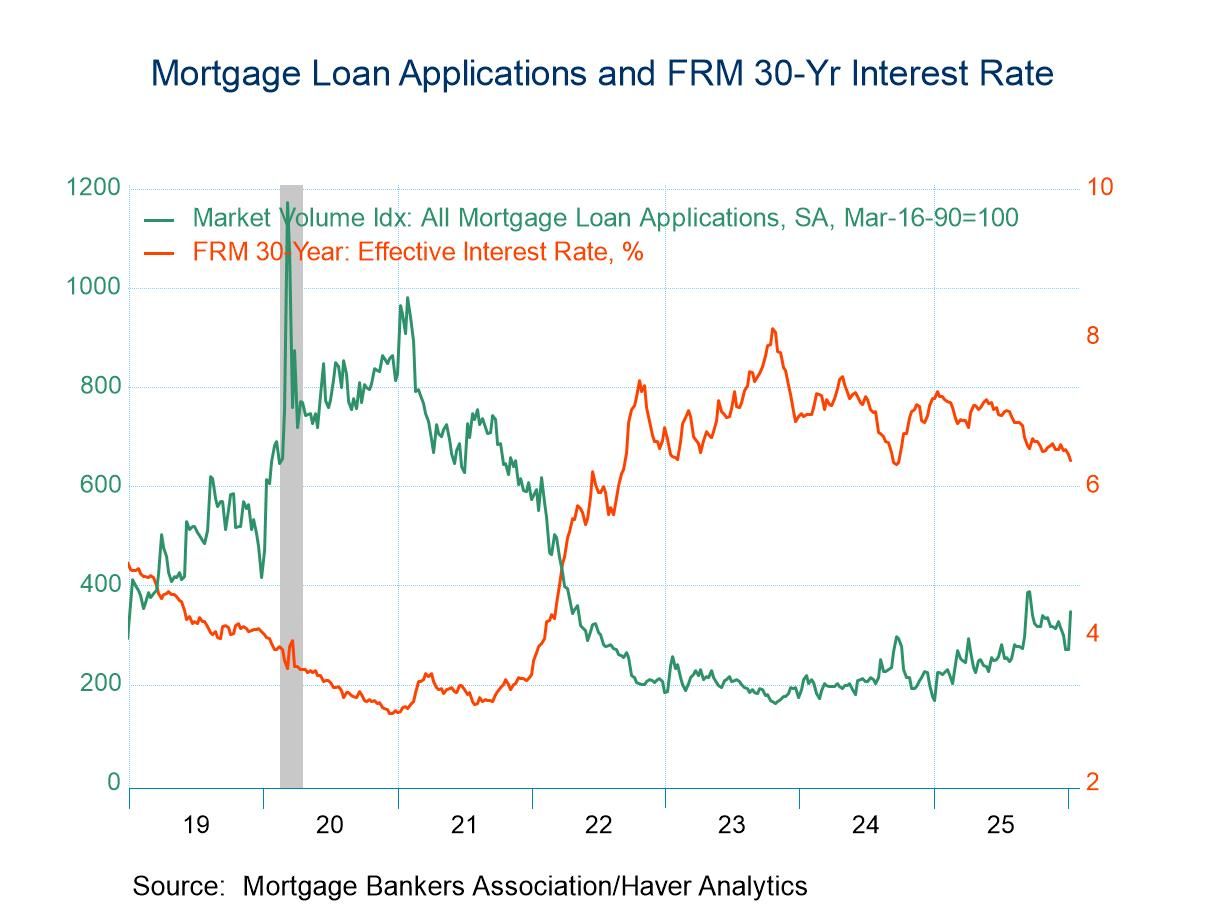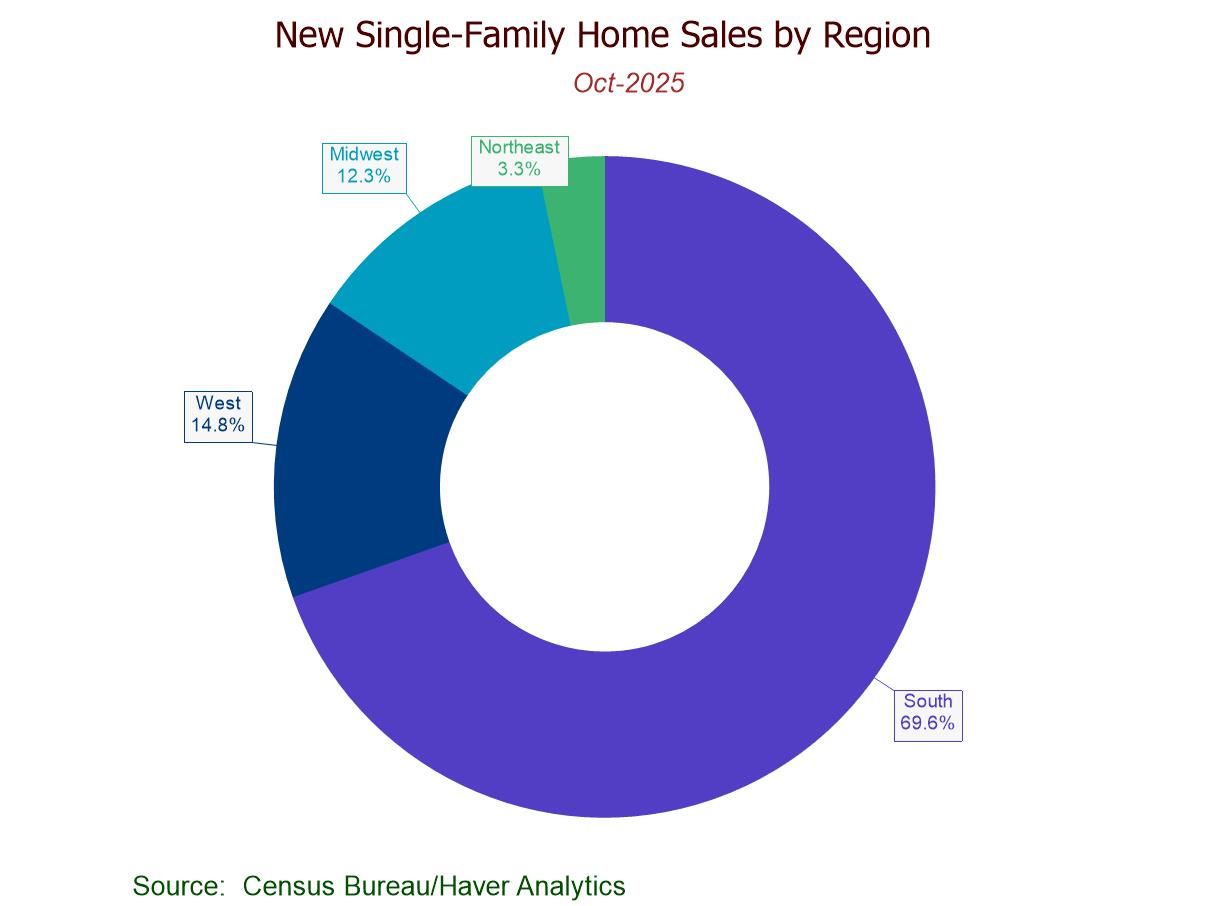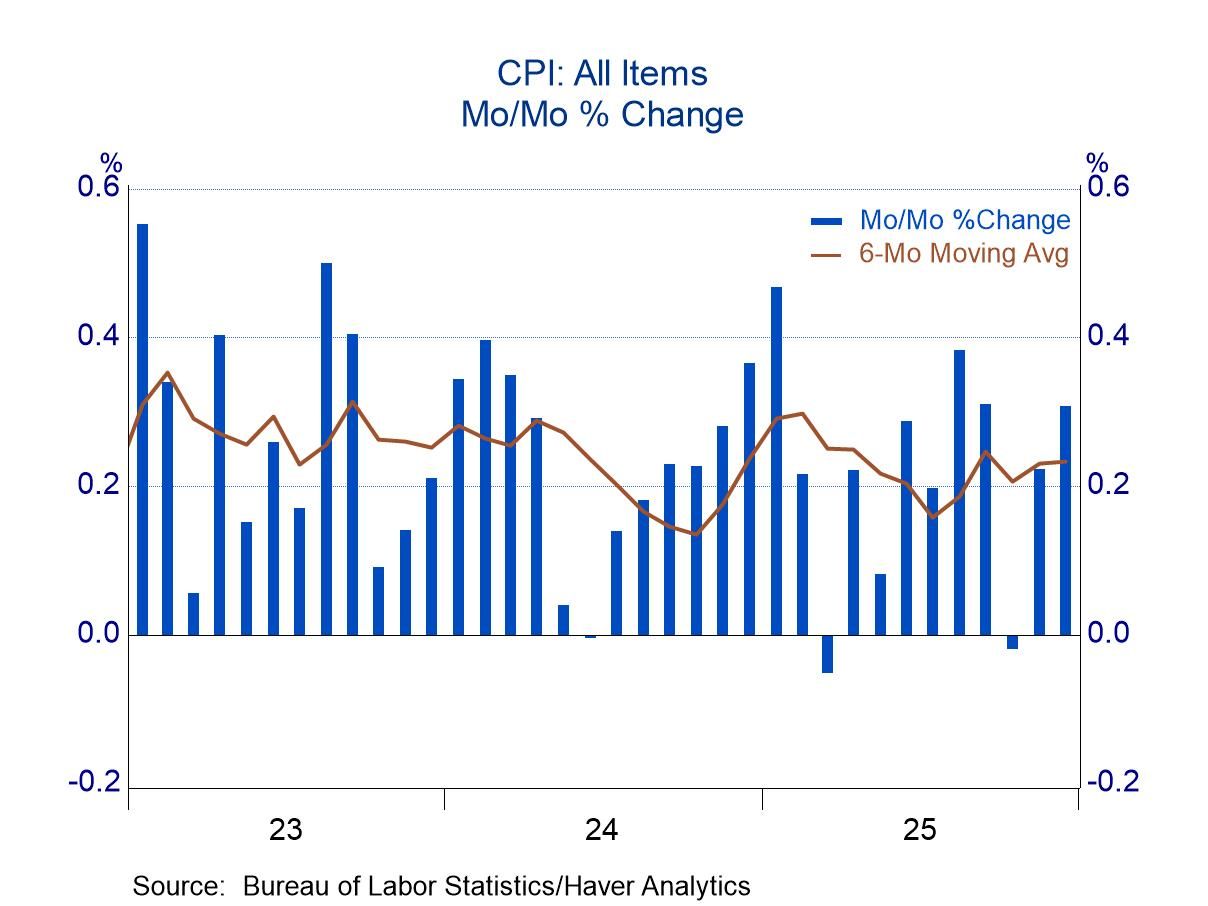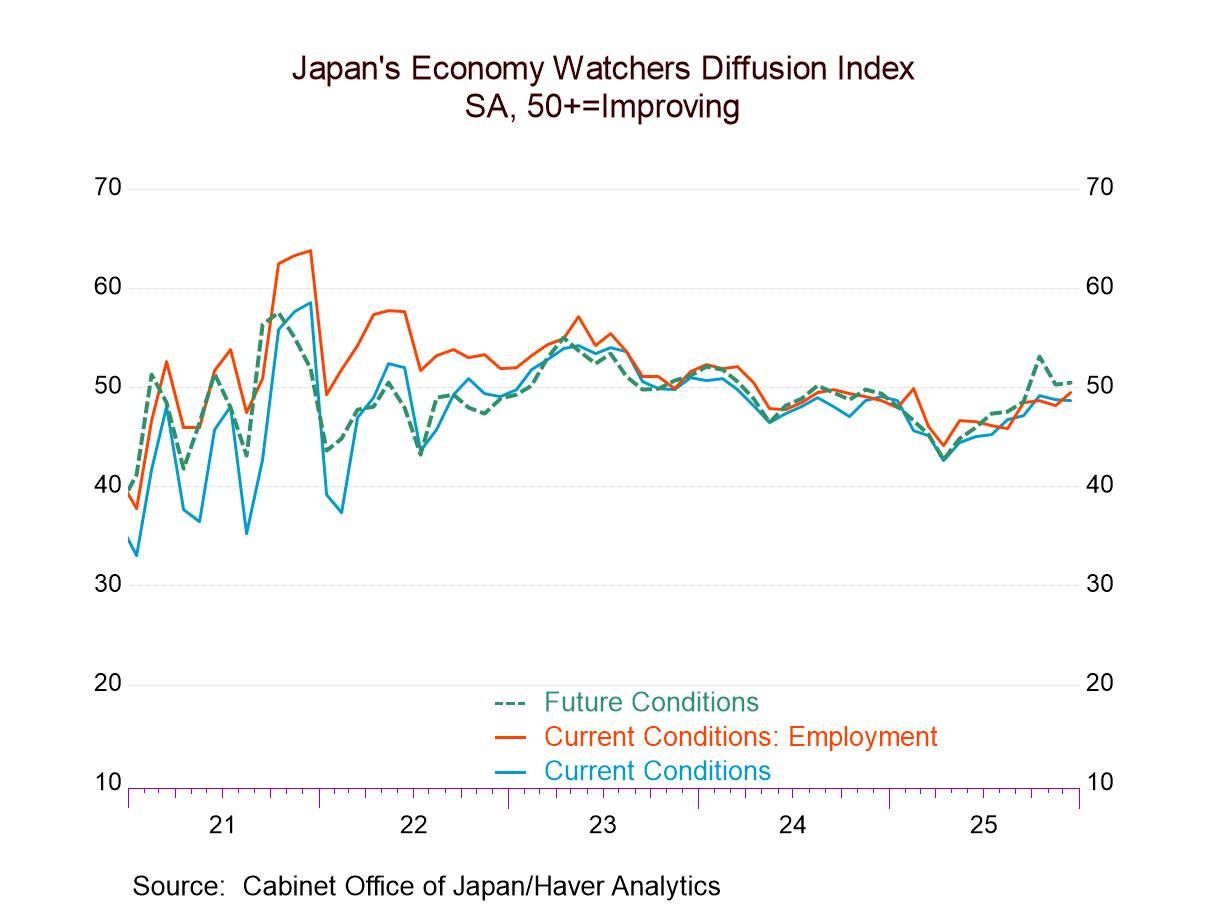 Global| Aug 30 2010
Global| Aug 30 2010Germany Climbs To 'New Post Recession' Heights; EMU Improves Both Progress And Unevenness Are Evident
Summary
It's still recovery - The EMU recovery remains in place as the Economic Sentiment index has risen again in August. Despite some rather extreme pessimism following 'Europe's' strong Q2 GDP showing we find that post-Q2 economic [...]
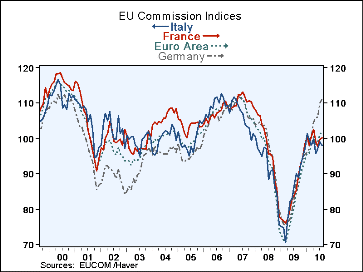 It's still recovery - The EMU recovery remains in place as the Economic Sentiment index has risen again in August.
Despite some rather extreme pessimism following 'Europe's' strong Q2 GDP showing we find that post-Q2 economic indicators
continue to spin up a positive story instead of languishing or deflating as some seemed to have expected. Like Christopher
Columbus the EMU has set out on a course of strong growth and has continued to go ahead instead of falling off the edge of
the world as some had expected. It may be that Europe's Q2 GDP was too good to be true in the sense that it was too good to
be sustained. But what we, perhaps, are discovering with each new report is that Q2 GDP was not so excessive that growth can't
continue to advance from that point onward. Q2 was not some last gasp of growth as some may have thought.
It's still recovery - The EMU recovery remains in place as the Economic Sentiment index has risen again in August.
Despite some rather extreme pessimism following 'Europe's' strong Q2 GDP showing we find that post-Q2 economic indicators
continue to spin up a positive story instead of languishing or deflating as some seemed to have expected. Like Christopher
Columbus the EMU has set out on a course of strong growth and has continued to go ahead instead of falling off the edge of
the world as some had expected. It may be that Europe's Q2 GDP was too good to be true in the sense that it was too good to
be sustained. But what we, perhaps, are discovering with each new report is that Q2 GDP was not so excessive that growth can't
continue to advance from that point onward. Q2 was not some last gasp of growth as some may have thought.
Germany dominates the Euro-Area optimism but does not stand alone - Judging GDP is going to be harder since GDP obeys some strict accounting rules. But the indicators on Euro- activity in the Zone for the EMU area seem to continue to show advancement. Germany is a big part of that since it is the largest economy in EU/EMU and its reports continue to surge ahead. But Germany has been progressing on export –led growth so if the Euro area truly were slowing the German export machine would probably not be firing on all cylinders as it appears to be doing.
Different stokes for different folks: dance to your music - Germany's economic index surged by 1% in August after a 3.8% jump in July. Spain's index also rose by 1% in August - in its case that came after a -2.4% thumping in July. But August did help to reduce the pain. Italy's index fell 0.9% in August following a 1.7% rise in July.
Euro-Area is Deutchefurcated? -- Germany has strengthened so much that its economic index ranks as its sixth strongest reading since October 1994. The EMU reading ranks 92nd on that same time frame. Out of 191 observations its rank leaves it in the mid-region just above the middle of its queue of values. Clearly Germany is much more improved than the rest of the Zone. Spain's economic index ranks 167th out of 191, a very poor showing but its index did rise this month by one percent. France and Italy's readings are in the 120 to 130 zone of their respective queues out of 191 observations. Clearly the German figures are juicing up the EMU average and the EMU region is either bifurcated or 'Deutchefurcated' with Germany doing much better than everyone else.
Consumer confidence is the Zone - Consumer confidence improved markedly in August at long last rising to a still weak -11 from -14 in July,. This 3 point jump is the fourth largest monthly rise since late 1984. At -11, confidence is better than you may think since its period average is -9.6. Still its August standing in the queue of observations is only in the 44th percentile.
The Confidence improvement IS widespread...The good news about consumer confidence improving is that while Germany (of course) leads in terms of how consumer confidence ranks across respective historic queues, improvements were seen in the month in France, Spain, and in the UK; Italy had a one-point set back. Out of 250 consumer sentiment observations Germany's rank is as the 13th best in its history while the next strongest rankings among France, Italy Spain and the UK is France at 134. Still it's improvement in progress.
Retailing was frozen overall - Retail Confidence did not improve in the Zone but it did improve in Germany, France, the UK and it slipped in Italy while it was static in Spain. Out of the last 253 observations the UK consumer ranks 6th strongest; the German consumer is the 17th strongest on that span; the French consumer ranks 26th. These are three pretty strong relative readings on the Consumer. Italy and Spain sport retail rankings of 225 and 207, respectively, both quite weak.
The key service sector has no fire - The service sector, potentially a big jobs creator, remained unchanged in August. Germany's index edged higher Italy's powered ahead, rising by four points. France's index was unchanged while the UK and Spain saw big back-tracking. The Euro-Area service sector index ranks 107th out of 152 observations (this index is one of the newer ones for the Zone). Germany ranks 41st in its historic queue; France is 98th and Italy is near the EMU norm at a rank of 108. Spain and the UK stand at rankings of 146 and 127, respectively. This is curious given some of the strong retailing rankings in the UK.
The Euro-Area industrial sector was flat but had a lot going on - We end this sector discussion with some news on the industrial sector which was static at a -4 reading in August, the same as it read in July. Still Germany, Spain and the UK saw some country-level improvement in their respective industrial sectors. Italy and France deteriorated by one point or two in the month. Out of 253 observations Germany at a rank of 35 has the best performing industrial sector relative to its own history and, at a rank of 50, the UK is next. After than Italy ranks 131 and France and Spain cluster around the 170 mark.
Uneven - The large EMU economics obviously are seeing some real variation and you can tell that while there are some surprises on strength and ranking (the UK rankings are particularly mercurial) the other countries are showing some consistency in terms of where they rank. Nonetheless there is a sense of things being mixed and still of there being progress. Slowly and with some backsliding there is progress and is it not just Germany dragging the Euro-Area readings higher. Among the EMU-wide industrial barometer's components the recent production trend reading ranked a strong 18 out of 253 while employment expectations was the next best component in the index ranking 40th out of 253; the overall industrial barometer for the Zone ranked 94th. Both overall order volume and export orders improved on the month. Despite all the talk about export orders about that series excellent performance, that series only ranked 118 out of 253 and it is still below the overall rank for the industrial index as a whole. Conclusion? Recovery is not just about exports.
Insight through the turbidity into the cross current - On balance the Euro-Area indices provide a certain richness in helping us to understand what is going on in the Zone. We can see that Germany is really the leading economy but it is not pulling the EU measures up all by itself. There is evidence of progress being made across the zone even as we also see evidence of difficulty and resistance as with Spain. But even Spain is not without some bright spots.
The time that oxymoron ruled - We will continue to walk on eggshells about the outlook especially as long as the US is uncertain and job growth is lacking there. But in the meantime look at the data. In these reports during these unusual times, the message will rarely be understood well by just looking at the report's headlines. Times are sophisticated. Central banks are running policies based on obscure notions of stimulus in some cases. Policy is concerned with all sorts of esoteric stuff that is in normal times not on the table let alone in the spot light. As central banks grapple with a new set of weapons and worries and as fiscal policy tries to deal with the issue of not snuffing out growth but also of reigning in excess we begin to learn more about what it is like to balance contradictory economic polices not just complicated ones.
10 Jul
10 Jun
10 May
10 %ile Rank Max Min Range Mean
10
| EU Sectors and Country level Overall Sentiment | |||
|---|---|---|---|
| EU | By Queue Rank % | Average Level | Rank of Change |
| Overall Index | 47.6% | 101.9 | 84 |
| Industrial | 63.4% | -6.6 | 51 |
| Consumer Confid | 44.0% | -9.6 | 4 |
| Retail | 88.0% | -5.5 | 73 |
| Construction | 16.8% | -16.0 | 98 |
| Services | 32.9% | 11.9 | 97 |
| EMU | 51.8% | 101.3 | 72 |
| Germany | 96.9% | 100.0 | 57 |
| France | 35.6% | 101.9 | 106 |
| Itlay | 27.7% | 102.2 | 161 |
| Spain | 12.6% | 102.1 | 80 |
| Memo:UK | 42.4% | 102.1 | 81 |
Robert Brusca
AuthorMore in Author Profile »Robert A. Brusca is Chief Economist of Fact and Opinion Economics, a consulting firm he founded in Manhattan. He has been an economist on Wall Street for over 25 years. He has visited central banking and large institutional clients in over 30 countries in his career as an economist. Mr. Brusca was a Divisional Research Chief at the Federal Reserve Bank of NY (Chief of the International Financial markets Division), a Fed Watcher at Irving Trust and Chief Economist at Nikko Securities International. He is widely quoted and appears in various media. Mr. Brusca holds an MA and Ph.D. in economics from Michigan State University and a BA in Economics from the University of Michigan. His research pursues his strong interests in non aligned policy economics as well as international economics. FAO Economics’ research targets investors to assist them in making better investment decisions in stocks, bonds and in a variety of international assets. The company does not manage money and has no conflicts in giving economic advice.



